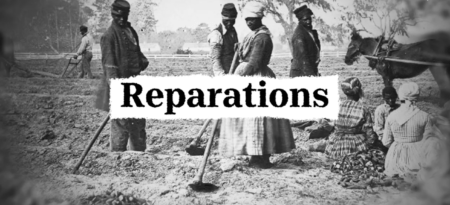
Lots of leftists – and people within racial justice spaces – discuss reparations. I’ve had some thoughts on it for awhile. And I revisited a solid article in Jacobin by Brian Jones. It’s called “The Socialist Case for Reparations.”
Jones gets one big thing right. He points out that as socialists we don’t need to adopt an either/or approach to issues of race and class. We don’t need to argue for either a broad social democratic vision that excludes race or a vision for reparations that caters to the black professional classes, ignores the role race plays in capitalism, and precludes a multiracial working–class coalition.
I’ll say a few things here about what I consider the best socialist case for reparations. In doing so, I’ll mostly leave open what, exactly, ‘reparations’ means. In the end, I think that adds up to the best socialist stance on the topic.
A Socialist Case for Reparations
So, Jones does a pretty good job giving the basic socialist case for reparations. I won’t add much to that. But, to recap: Race is one of the key tools of capital. Capital uses race to get at many of its aims. Most leftists know about this, insofar as we apply it to the early capitalist era of primitive accumulation and slavery. But it’s also true today. Capital still divides people by race and creates racist structures, enabling it to win victories in the class war.
However, unlike certain perspectives (most versions of critical race theory and other forms of ‘race-first‘ analysis), I don’t think capitalism requires race and racism to survive. That is to say, I think capitalism could survive in a world without racism. And so, leftists have a case to focus on anti-racism and anti-capitalism together. We can’t use one as a proxy for the other, in the way we see it with either CRT or certain forms of class reductionism. Getting the left where it needs to go requires both.
To focus on the race part, I find certain areas where we do need reparations. In order to succeed, working-class groups must build workers into a fighting force. We have to ensure that workers survive and thrive. Mutual aid groups work on this at the level of basic needs. But we need to do more than this.
But What Is ‘Reparations’?
That’s where reparations enter the picture. One key task of any socialist reparations program is to figure out what ‘reparations’ amounts to. If it’s just a cleverly rebranded version of standard policy, like Evanston did, then it doesn’t work. And if it’s just a matter of ‘cutting a check’ (i.e., offering a payment to black Americans), that doesn’t work either. It doesn’t really do the kind of moral or repair work the term connotes.
Ultimately, we have to center black Americans in discussions of what all this means, especially at the policy details. But, at a broad level, I’d expect a good leftist reparations program to include some aspect of truth and reconciliation. It gets to the heart of what happened and how we repair it. It would probably involve a financial component, but that would serve the larger goal of repairing certain harms. Money can’t be the central goal.
In thinking about this as a socialist, I see it as a part of a movement to put workers in a position to fight capitalism. The moral and physical harms around race in American prevent that from happening. Especially as many workers are black (and many black Americans are workers).
A Socialist Stance
And so, yes, I think socialists should support reparations. But that doesn’t mean we should support just any policy carrying the label. The current US political system seems unlikely to produce the kind of reparations proposal that socialists should support. And even promising alternatives from the left tend to go astray in some ways.
We should support versions that enjoy the support of black Americans, remedy the harms of racism, and help people organize across racial lines and divisions. Each of these things is necessary, while none on its own is sufficient.